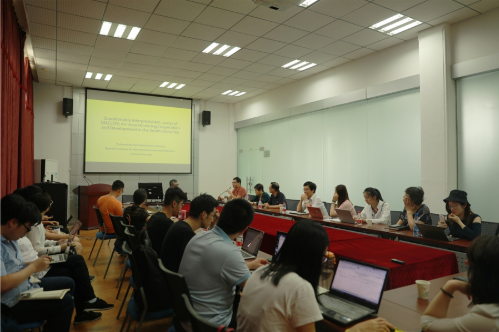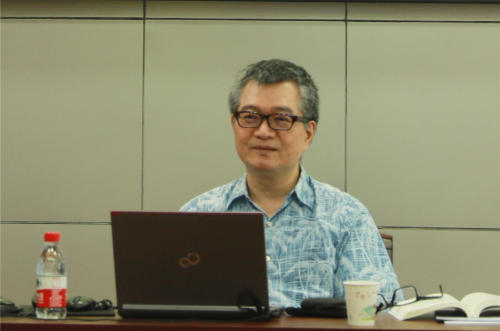On 11 June 2018, Gao Shengti, Head of Hainan University Research Institute for International Judicature and Arbitration, visited Wuhan University China Institute of Boundary and Ocean Studies (CIBOS), and delivered a talk on misinterpretation of UNCLOS Article 121(3). Associate dean of Wuhan University China Institute of Boundary and Ocean Studies (CIBOS), Kong Lingjie, hosted the seminar. Cheung Haiwen, Director of China Institute for Marine Affairs (CIMA), and Yang Li, Deputy Director of Research Center for Ocean Law and Policy in National Institute for South China Sea Studies, attended the symposium as honored guests. Teachers and students from CIBOS and Institutes for International Studies (IIS) participated in this academic seminar.

Prof. Gao studied China-Philippines South China Sea arbitration award on substantive issues and discovered that ad hoc arbitration tribunal created a word ‘high-tide feature’, which does not exist under United Nations Convention on the Law of the Sea (UNCLOS). This word is used to dim the difference between ‘rock’ and ‘island’. The ad hoc arbitration tribunal called rocks and full-entitled islands with a general term ‘high-tide features’, and claimed that both rocks and full-entitled islands cannot claim exclusive economic zone (EEZ) and continental shelf according to Art.121 (3). But the truth is stipulation under UNCLOS Art.121(3) is widely divergent with the interpretation given by the tribunal, which violates treaty interpretation principles under The Vienna Convention on the Law of Treaties (VCLT) and deviates from connotation of the clause itself.

(Prof. Gao Shengti)
Prof. Gao emphasized that ad hoc arbitration tribunal’s work is to ‘interpret Convention’ rather than ‘modify Convention’. The tribunal used the placard of ‘treaty interpretation’ and played the role of ‘lawmaker’ by ignoring the context and modifying pivotal clause. Prof. Gao held the opinion that rocks can sustain human habitation or economic life of their own shall have EEZ and continental shelf according to argumentum e contrario of UNCLOS Art.121 (3). China claimed sea area in South China Sea based on Nansha Islands, Xisha Islands, Zhongsha Islands and other islands group. This kind of claimant based on archipelago can be legalized by argumentum e contrario of UNCLOS Art.121(3).
(Rewritten by Yu Minna)
(Edited by Fu Shanshan)
